All histories allow a clearer understanding of the role and culture of an organisation - and that of individuals within it - and may assist in planning future directions. Recording your history contributes to a better understanding of our society and the world around us.
Professional historians may undertake a broad range of projects other than personal or organisational histories. Many engage in specific historical research, conducting heritage surveys or studies, managing heritage conservation and other projects, obtaining documentary evidence, conducting oral history programs, undertaking research on legal matters, presenting evaluations, or providing advice on historical matters.
Professional historians can assist in areas ranging from modest displays to complex, long-term exhibitions. They play a critical role in producing booklets, walking trail guides, displays, museum exhibitions, promotional material, film and radio presentations and multimedia productions.
Good research and analysis is necessary to all history projects. It is crucial in litigation and the assessment of historical significance for heritage registration, resolving disputes over heritage significance, and undertaking native title research.
What is the best way to tell the story?
Those commissioning a history often think first of a book, be it a 'coffee table' book or scholarly publication. However, a booklet or a collection of oral histories might be preferred.
Perhaps a radio program, audio-visual production or exhibition could tell the story better. The history may be suited to a multimedia presentation or website where it is able to reach a wider audience. An experienced professional historian is able to provide advice on the most effective way to tell a story.
What resources are available?
An organisation or individual will generally have written records, photographs or other items that are critical to the production of the history. Professional historians are well versed, however, in complementing these sources with a wide range of appropriate material in libraries, archives, museums and private collections.
Oral histories can provide another rich resource. The employer may also have knowledge of additional information and can give access to equipment, office space and administrative assistance.
What will a history cost?
It is important for potential employers to consider the costs that may be involved in their history project.
Like other professionals, professional historians require appropriate remuneration for their services based on their qualifications and expertise. The cost of employing a historian will include the historian's professional fees, fees for any research assistance, a research allowance (for example, for obtaining copies of photographs and archival documents, accessing certain collections or purchasing audio-visual material) and the cost of any travel or associated expenses.
These costs - certainly the historian’s fee - can be determined relatively accurately before the project begins and included in a contract or brief. Our recommended scale of fees for accredited professional historians can be found here.
There are also costs associated with the anticipated finished product. The expenditure on the finished product may include printing and publication expenses that vary greatly in accordance with print runs and production quality.
In addition, there are reproduction fees, editing and/or proofreading, project management, design, indexing, marketing, website hosting, copying and distribution costs for heritage assessment reports and documents, and any relevant fees for presenting evidence in court cases. These cannot be accurately determined before the project begins, but they can be estimated for budgeting purposes by making comparisons with similar products.
A clear brief and contract need to be agreed on through negotiations with the professional historian selected for the work. A model contract is available here as a guide.
How long will the history take?
This depends on the wishes of the potential employer, the intended final product and, to an extent, the budget that has been allocated. It is important that employers provide sufficient time for their project to ensure a high quality product of which all can be proud.
In the case of published histories, several months may be required from the completion of the manuscript to the actual publication of the history, depending on the size and format. The time will depend on who is responsible for producing the history.
In the case of a book, the manuscript needs to be edited and corrected, the employer needs to sign off on the product and perhaps seek legal advice, the content should laid out by a designer including the use of any images, the cover designed, the proof checked, and the work indexed before printing and binding.

